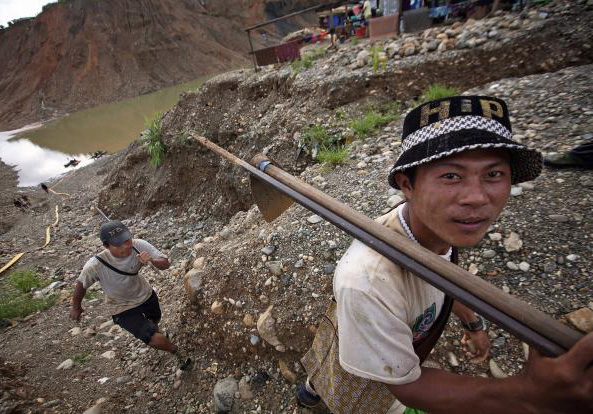
Jun 3, 2016
An opinion piece by Vani Sathisan, ICJ International Legal Adviser, and Sean Bain, ICJ Legal consultant, in Yangon.
“The scale and severity of human rights violations in Kachin State is one of the worst in Myanmar,” a lawyer told the International Commission of Jurists during a meeting in Myitkyina last month.
Visitors walk along the riverbank at the Myitsone in Kachin State in December 2015.
Illegal large-scale land grabbing, harassment of landowners by government and business officials, and a lack of access to justice were the central complaints heard by the ICJ during the discussions with human rights defenders and civil society groups in Kachin State.
Senior state-level judicial officials signalled increased readiness to discuss ways to improve the effectiveness and independence of the courts.
Yet meaningful reform also requires revising laws to bring them in line with international human rights standards, respecting judicial independence by government officials, and securing corporate legal compliance through consistent application of the law and access to fair and effective judicial review.
The conflict in Kachin State and northern Shan State, where over 100,000 people remain displaced since fighting between the government and ethnic armed groups re-started in 2011, is partly fuelled by the abundant natural resources.
Eighty percent of Myanmar’s mining operations are located in Kachin State and neighbouring Sagaing Region. Timber, rubies and gold are plentiful.
A report by international watchdog Global Witness estimated the value of illegal jade mining at around US$31 billion in 2014 alone.
Yet hazardous mining practises are rampant while law enforcement is haphazard.
Last November, the jade-rich town of Hpakant made global headlines when over 100 itinerant miners died in a landslide of mine waste. Mining continues to be notoriously unregulated, leading to another accident this week, with a dozen more killed and many more reported missing after a downpour triggered the collapse of a massive slag heap.
At the same time, villagers near Uru Creek in Hpakant were protesting for the shutdown of a gold-mining operation, citing the dumping of waste, erosion of the riverbanks and obstruction of water flow.
The ICJ viewed photos taken in a jade-rich area of Mohnyin township, to Myitkyina’s southwest, purporting to show arson attacks on the homes of farmers.
Their lawyers say a local company mobilised thugs to attack property and physically assault farmers for refusing to vacate land earmarked for mining operations.
Local pro bono lawyers are putting together a case against the company, alleging it confiscated land in violation of Myanmar law and is responsible for the harassment of the farmers. The ICJ has provided lawyers in the area with training on strategic litigation for corporate abuse of human rights.
In the Hukawng Valley toward Myanmar’s northwest border, farmers are facing loss of livelihoods due to agribusiness initiated by a Yangon-based conglomerate.
Local activists told the ICJ that the courts have been reluctant to hear community allegations of forced displacement and intimidation by government and company officials.
They understand the company has received permissions at the Union level, but say that the actual activities do not comply with the laws, which are in any event not enforced.
Farmers allege that local police have threatened them with prosecution if they continue agricultural activities in the contested area.
Myanmar’s system for land regulation consists of overlapping laws that seek to prioritize investment but fail to protect the rights of all land users.
Rules governing acquisition of land exist, but are rarely followed. Insecure tenure rights, corruption and lack of enforcement means that farmers can find their land arbitrarily classified as “virgin” or “vacant” and then reallocated to companies or state enterprises.
For the local people, secure access to land is fundamental to the realization of a range of internationally recognized human rights, including to an adequate standard of living, food and water, housing and health.
These rights are enshrined in the International Covenant on Economic, Social and Cultural Rights, signed by Myanmar in 2015 but yet to be ratified or practised in the country.
The government has a duty to create a legal framework consisting of land acquisition laws that are compatible with international human rights standards, and to enforce regulations that require environmental and social impact assessments.
State Counsellor Daw Aung San Suu Kyi has stated that land reform would be a top priority for the National League for Democracy government.
Amendments to laws should be guided by principles of public participation and international human rights standards, including the United Nations basic principles and guidelines on development-based evictions and displacement, and the Voluntary Guidelines on the Responsible Governance of Tenure.
The law must also create a process for public purpose land acquisition – based on the UN guidelines on evictions and displacement – which ensures transparency and accountability in the process, and requires that all such acquisitions be demonstrably justified.
The framework should also be consistent with the National Land Use Policy finalized last year following consultations with farmer networks and civil society groups.
It should affirm the duty of companies to comply with laws and respect human rights. This is required to enable just and effective remedies for those affected by development projects.
As seen in Kachin State, the approval of investments without requisite checks and legal safeguards, along with substandard enforcement mechanisms, undermines democratic processes and human rights norms.
In Kachin State, as elsewhere, bold farmers and lawyers are challenging unjust laws and the arbitrary implementation of laws that violate human rights.
Many see these cases as unwinnable due to executive and administrative control over judges and prosecutors, in breach of international standards on the independence of the judiciary and the role of prosecutors.
But these cases do highlight issues with the content and application of law, with the aim of promoting regulatory change for public good.
At the moment, lawlessness and impunity continue to enable human rights abuses and environmental damage. Land grabbing results in human rights violations.
Local and foreign companies can, and do, flout domestic and international law without penalty.
And authorities are too often complicit in crimes while courts are used to intimidate and silence victims.
Strengthening the rule of law will be critical for enabling human rights and democracy in Kachin State.
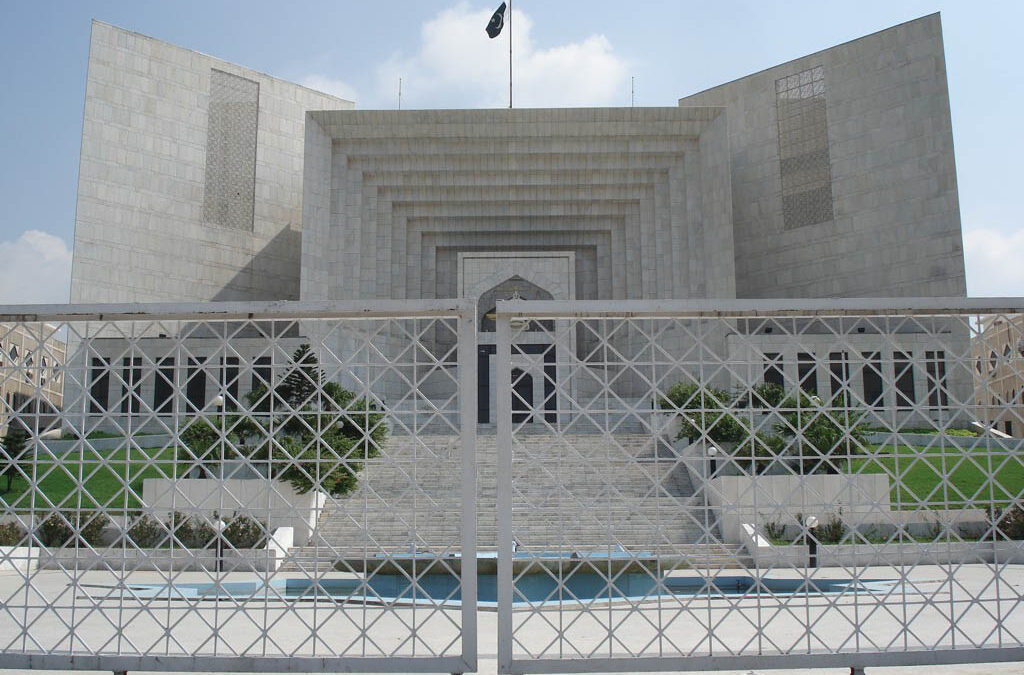
May 23, 2016
An opinion piece by Reema Omer, ICJ legal adviser in Pakistan.
Chief Justice Anwar Zaheer Jamali has declared the year 2015-2016 as the year of judicial accountability.
Judicial independence has long been a flashpoint in Pakistan, as illustrated by the movement nearly a decade ago to reinstate the unlawfully deposed former Chief Justice Iftikhar Muhammad Chaudhry.
However, accountability has largely been absent from this discourse.
Without accountability, independence has the potential to act as a shield behind which judges have the opportunity to conceal possible unethical behavior.
Indeed, judicial accountability is part and parcel of judicial independence, since a judge whose conduct and decisions are influenced by extra-legal elements cannot be independent.
Under International standards, including UN Basic Principles on the Independence of the Judiciary, therefore, the independence and accountability of the judiciary are inextricably linked.
Chief Justice Jamali’s focus on accountability within the judiciary is welcome, as corruption in the judiciary is a longstanding and chronic issue in Pakistan.
Transparency International’s corruption perception surveys, for example, frequently place the judiciary as the most corrupt institution in the country (along with the police).
CJ Jamali’s focus on accountability in all tiers of the judiciary, including the high courts and the Supreme Court, is an important aspect of the accountability drive.
In the past, where judges have acknowledged corruption in the judicial institution, the focus has been limited only to judges in the subordinate judiciary.
The National Judicial Policy adopted by the Supreme Court in 2009, for example, recommended that strict action be taken against district and sessions judges who carry a “persistent reputation of being corrupt”.
However, while judges of the superior courts were encouraged to decide cases expeditiously, there was no recognition of corruption or other misuse of authority by judges of the Supreme and high courts in the policy.
The Chief Justice’s vision on accountability rests on “activating” the Supreme Judicial Council (SJC), which under Article 209 of the Constitution is tasked with carrying out inquiries into the capacity and conduct of Supreme Court and high court judges.
The SJC comprises the Chief Justice of Pakistan, the two most senior judges of the Supreme Court, and the two most senior chief justices of the high courts.
Disciplinary proceedings are initiated before the Council if there is information from “any source”, or it is the opinion of the President of Pakistan, that a judge from the superior judiciary is either incapable of performing his or her duties due to mental or physical incapacity, or that he or she may have engaged in misconduct.
A finding of guilt by the SJC is the only method by which a judge of the Supreme Court or of a high court can be removed.
The Chief Justice has acknowledged that the SJC has been rendered ineffective because of prolonged delays in deciding complaints: according to the CJ, 90 per cent of cases before the Supreme Judicial Council have become moot, as the accused judges retired while their cases were still pending.
In addition, especially in the recent past, military governments and judges of the Supreme Court have also undermined the authority and the constitutional role of the Supreme Judicial Council.
The most glaring (and damaging) recent example occurred after General Musharraf’s proclamation of emergency in 2007, when the unlawful sacking of then Chief Justice Iftikhar Muhammad Chaudhry and other judges of the high courts and Supreme Court was justified in the name of “judicial accountability”.
These judges were dismissed without the involvement of the Supreme Judicial Council.
Ironically, under the leadership of Chief Justice Chaudhry, the process of circumventing the Supreme Judicial Council continued.
Following restoration in 2009, the Supreme Court gave at least 72 judges who were accused of taking oath under General Musharraf’s provisional constitution the option of resigning or facing contempt of court charges. Their plea to appear before the Supreme Judicial Council for hearing was dismissed by the Supreme Court.
In this context, therefore, Chief Justice Jamali’s focus on rejuvenating the Supreme Judicial Council to perform its constitutional role is a welcome move.
The process of judicial accountability, however, will require much more. Some of these issues were highlighted at a conference of leading judges and lawyers convened by the ICJ in December 2015 on holding judges accountable for involvement in corruption, human rights violations and other misconduct:
First, measures must be taken to ensure that disciplinary proceedings are not used as a means of intimidation, harassment, or retaliation against judges for exercising their judicial functions independently and diligently.
At the minimum, this would mean that disciplinary proceedings against judges are strictly according to the provisions of the Constitution and international standards, and must meet all fair trial and due process guarantees.
Second, transparency should be a key aspect of disciplinary proceedings against judges. The number of cases referred to the Supreme Judicial Council; the legal and evidentiary bases for the complaints; the time taken for adjudication; and the outcomes of the proceedings must be made public – both to maintain the public’s confidence in the administration of justice and also to protect the interests of the parties involved.
Third, what amounts to judicial misconduct must be clearly defined and must be appropriate under the rule of law.
While the current understanding of misconduct seems limited to financial corruption, nepotism and misuse of authority, perhaps what is also needed is the recognition of the role of judges in undermining human rights protections or facilitating violations or impunity for such violations.
One of the ways this can be done is to revise the judicial code of conduct to bring it in line with international standards, including reflecting the duty of judges to guarantee and protect human rights.
And finally, judicial immunity under section 77 of the Penal Code and other provisions of the law, which protect judges from liability resulting from their “good faith” judicial actions, should never insulate judges from prosecution for serious crimes and crimes under international law.
If carried out fairly, expeditiously and transparently, the judicial accountability drive initiated by the Chief Justice can be a step towards restoring public confidence and trust in the judiciary, which has long suffered because of neglect of the problems plaguing the institution. It will also bring Pakistan closer to an independent judiciary, in a truer sense of the term.
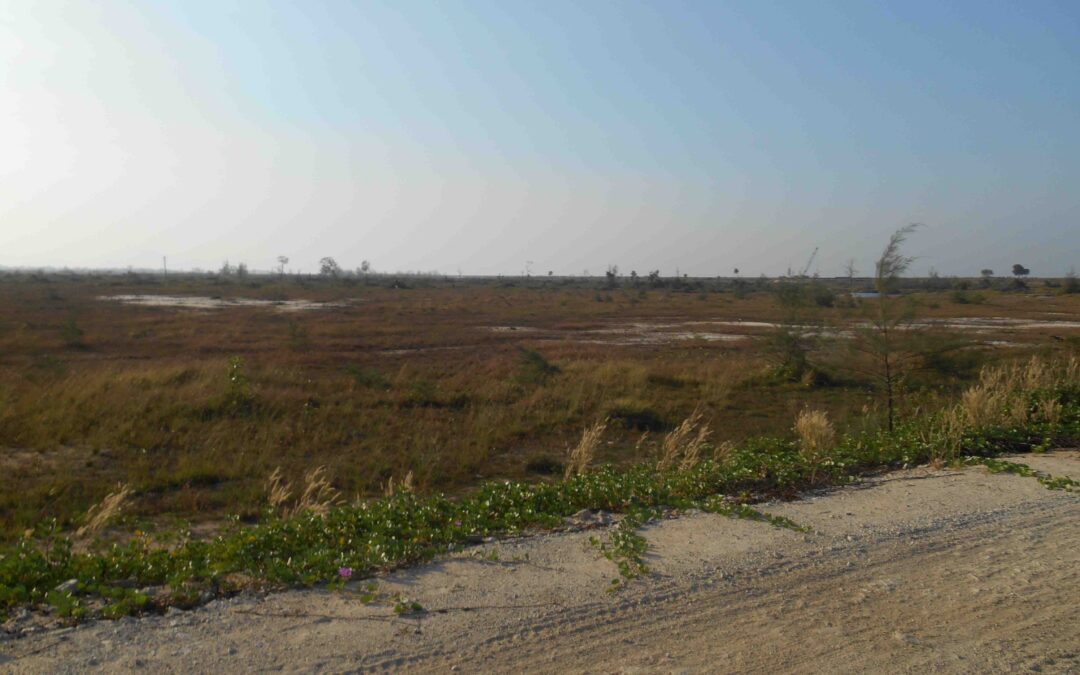
Apr 1, 2016
An opinion piece by Vani Sathisan, ICJ’s International Legal Adviser in Myanmar, and Bobbie Sta. Maria, Senior Researcher for Southeast Asia, Business & Human Rights Resource Centre.
More than half a century of military rule ostensibly comes to a close on April 1, when Daw Aung San Suu Kyi’s National League for Democracy officially takes over Myanmar’s government and the first civilian President since 1962 starts leading the nation.
Despite these extraordinary developments, daunting challenges remain in Asia’s second poorest country. Myanmar’s military still controls key governmental functions; the country is barely emerging from decades of civil conflicts; rule of law and institutions are weak; the economy is fragile and dominated by crony companies; corruption, and human rights abuses remain stubbornly persistent.
In opening up, Myanmar has embraced special economic zones (SEZs) – designated areas in which businesses receive tax, tariff and regulatory benefits – as a means to encourage economic trade and investment heavily promoting three major zones; Thilawa, Dawei and Kyaukphyu.
But in all three, affected communities have repeatedly complained about the need to address human rights and environmental harms caused by the projects, including land, air, and water pollution, and the displacement and loss of traditional forms of livelihoods of thousands.
Communities in these zones have also voiced concerns about a lack of transparency, inadequate consultation and participation of affected local communities in project-related decisions, and insufficient compensation for losses.
While SEZs are supposed to drive Myanmar’s economic growth, at the moment it looks as if this growth disproportionately rewards businesses and investors, and not the communities displaced and impoverished to make way for them.
Business & Human Rights Resource Centre and the International Commission of Jurists are engaged in efforts to encourage greater public accountability among foreign companies for their human rights impacts – including by highlighting concerns of affected communities with businesses, providing guidance, and tracking companies’ investments and efforts to avoid negative impacts – but a concerted response by government is vital.
The National League for Democracy taking office is crucial, because whilst they support the Thilawa zone, they have said they will review the continuation of the Dawei and Kyaukphyu zones including by speaking with relevant stakeholders.
We hope that the new regime will not lose sight of its commitments in its Election Manifesto, including encouraging “foreign investment in line with the highest international standards”, and laying down “paths for economic cooperation that can bring sustainable long-term mutual benefits”.
The problems surrounding SEZs are significant and urgent. This period of re-evaluation provides the new government an opportunity to fulfill its duty to protect affected communities.
They can build upon the limited progress of the previous government in legislating rights protections by ensuring that laws are properly implemented.
For example: Myanmar law now requires environmental impact assessments (EIA) for investments in certain industries.
The newly approved EIA Procedures cover environmental and social impacts and incorporate international best practices on involuntary resettlement and indigenous peoples. The new National Land Use Policy refers to participatory, transparent and accountable processes.
The new government must amend the SEZ law to ensure that investment projects are planned, designed and undertaken with respect for the fundamental principles of participation, transparency and accountability.
While land issues are undoubtedly complex, the prevalence of land-related grievances presents a challenge for the new government to take bold steps towards the protection of land rights, including addressing illegal land acquisitions and making real efforts to meet international standards for consultation, compensation and resettlement.
By design, SEZs are meant to lure businesses through friendly conditions.
But this goal must not be pursued at all costs, especially not in ways that will lead to irreversible environmental damage, abuse of rights, or further impoverishment of locals.
The challenge to govern carries with it the responsibility to listen, respectfully engage, and ensure the protection of the human rights of all people in Myanmar.
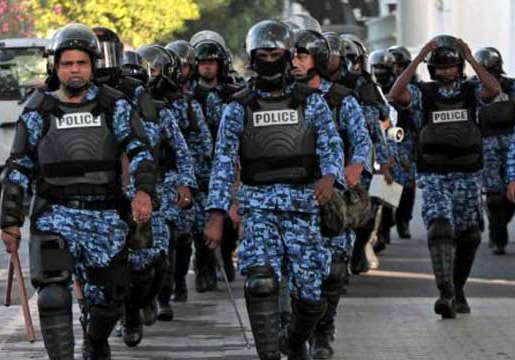
Mar 29, 2016
An opinion piece by Nikhil Narayan, ICJ’s Senior Legal Adviser for South Asia.
The government of President Yameen Abdul Gayoom of the Maldives continues to abuse an overbroad anti-terror law as a blunt-force tool to arbitrarily and indiscriminately silence perceived political threats to his regime.
During a recent visit to the Maldives last month, I was alarmed by the numerous and increasing number of terrorism trials against public officials.
While international attention has relaxed in recent months following former president Mohamed Nasheed’s medical leave to the UK pending appeal of his own terrorism conviction from last year, President Yameen’s government continues to use a deeply politicized criminal justice system to persecute anyone out of favour with the President, be they opposition party members, judges, even former cabinet members and erstwhile allies.
In October 2015, for instance, then-Vice President Ahmed Adeeb was arrested in connection with a suspected bomb blast on a boat carrying the President, even though a US FBI investigation was unable to conclude that the explosion was caused by a bomb.
The then-VP was subsequently summarily impeached and soon thereafter charged with several counts of corruption and terrorism.
During a 15 February 2016 hearing, a terrorism charge based on an alleged firearm seen in the former VP’s residence in April 2015 was formally presented and disclosed to the defense for the first time, though the defense continues to be denied access to the evidence or witness list in this case on national security grounds.
A second charge of terrorism against the former VP, this one in connection with the alleged bomb blast on the President’s boat, was filed on 17 March.
The defense was not formally notified of this new charge, only learning of it through media reports.
Here too, the defense is yet to be given access to any government witnesses or evidence relating to the charge.
Such denial of access to evidence and witnesses contravenes the right to prepare an adequate defence and the right to test evidence, fundamental components of the right to fair trial.
On 16 February, leader of the opposition Adhaalath party, Sheikh Imran Abdullah, was convicted and sentenced to 12 years’ imprisonment on terrorism charges in connection with a public speech given during an opposition protest rally.
The disproportionately severe punishment in Sheikh Imran’s case – a 12-year ‘terrorism’ sentence for a political speech – was the outcome of an arbitrary and unfair trial process fraught with apparent fair trial violations, including allegedly doctored evidence.
Two more recent victims of inappropriate ‘terrorism’ charges are Magistrate Judge Ahmed Nihan and former Prosecutor General Muhthaz Muhsin, both of whom were arrested on 7 February in connection with an alleged ‘forged’ arrest warrant against the President for his alleged role in a major corruption scandal involving the embezzlement of several million dollars of state funds.
On 8 March, more than one month after the arrests, both were charged under sections 4(a) and 5(a) of the Prevention of Terrorism Act, 2015, for conspiring to ‘kidnap’ the President.
Meanwhile, on 15 March, former Defense Minister Col. (retd.) Mohamed Nazim’s conviction on ‘weapons smuggling’ charges (based on the discovery of one pistol and three bullets allegedly found in his home in January 2015) was upheld by the appellate High Court, one year since his conviction and three months since the final hearing in his appeal.
The ICJ has previously documented in detail, in its August 2015 fact-finding report, the substantial fair trial violations in Col. Nazim’s investigation and trial, including indications that the weapons in question were planted, that implicate an arbitrary, unfair and politically motivated proceeding.
There is a clear pattern here of the Maldives government seeking to neutralize certain political actors through arbitrary, heavy-handed and politically motivated abuse of the anti-terrorism law that amounts to a flagrant violation of the basic international principles of fair trial, judicial independence and separation of powers.
It is also a clear breach of the Maldives’ international legal obligation to respect the right to fair trial under article 14 of the International Covenant on Civil and Political Rights (ICCPR), to which the Maldives acceded in 2006.
The misuse of anti-terror laws in the Maldives seems part of an effort to halt and reverse the progress made during the country’s brief democratic transition after 2008.
As the country faces growing political unrest and instability, President Yameen’s government must restore the rule of law, strengthen the judiciary and other democratic institutions, and set the country back on the path towards a more representative and accountable government.
An important first step in doing so is immediately ceasing from using the anti-terror law as a political weapon to chill the actions of public officials and silence real or perceived political opponents, and ensuring that those currently facing criminal charges are provided a fair trial in accordance with the Maldives’ international human rights obligations and its national laws.
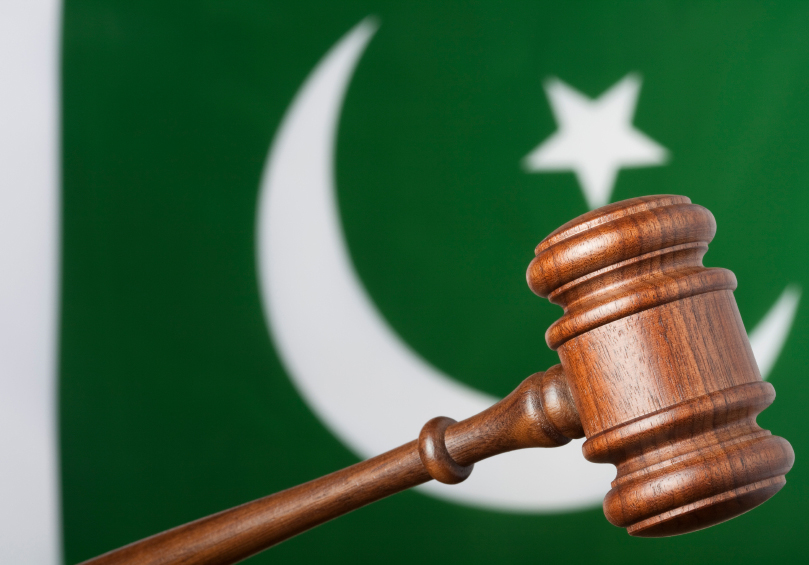
Mar 15, 2016
An opinion piece by Reema Omer, ICJ International Legal Adviser for Pakistan.
Nearly a century after the Legal Practitioners’ Act was amended to remove the legal bar on women from practicing law in India, women lawyers and judges in Pakistan have come a long way.
However, significant challenges still remain that impede women’s access to positions of leadership in the legal profession.
It is time that all institutions of the State recognize the importance of women’s full and equal participation in the legal profession for the fulfillment of equality, social justice, and human rights in the country.
This means also that as a matter of priority, they must act to dismantle the barriers that contribute to women’s exclusion from positions of leadership.
The amendments to the Legal Practitioners’ Act in 1923 were a response to the refusal of high courts in Calcutta and Patna to allow qualified women lawyers to practice in courts as they were considered “unfit for the duties of the legal profession.”
Opposing the Bill at the time, Maulvi Mian Asjad-ul-ulah from Bhagalpur Division, said in the legislative assembly such an amendment would be antithetical to justice, as “susceptibility to female charms” would make male judges and witnesses partial towards women advocates, and in the long-run, women would “take the practice away from men.”
Another member of the legislative assembly, Khan Bahadur Abdur Rahim Khan from the North-West Frontier Province, supported the Bill because “the presence of ladies as barristers in court will make the judges and the barristers behave themselves.”
Sentiments constituting similarly pernicious gender stereotyping are still being repeated in Pakistan almost 100 years later.
For example, Maulana Sherani, the chairperson of the Council of Islamic Ideology, said last year that only women over the age of 40 could become judges as that is when “women no longer remain attractive or marriageable.”
Similarly, in a private conversation, a retired judge of the Supreme Court said that because of their “caring and sensitive nature”, women were unsuitable for “hard legal matters” and if they are to practice, they should focus their practice on “softer” areas of the profession, such as family law.
Perhaps unsurprisingly, such attitudes have contributed to the near-exclusion of women from positions of authority and leadership in Pakistan’s legal profession and the judiciary.
As highlighted by the Human Rights Commission of Pakistan at a recent conference on International Women’s Day, Pakistan is the only country in South Asia to have never had a woman Supreme Court judge (India, Nepal, Bangladesh and Sri Lanka have all had women serve in their highest courts), and only seven out of Pakistan’s 120 High Court judges (5.8 per cent) are women.
Even in the district judiciary, where women are appointed judges in greater numbers, the representation of women judges sharply decreases with seniority (and hence authority).
In Punjab, for example, while 20 percent civil judges are women, the figure drops to five percent in senior civil judges.
Similarly, while seven per cent of additional district and sessions judges are women, the number of district and sessions judges, who have executive and judicial control over their districts, is only two percent.
The Bar too shows similar gender imbalance. Since its inception in 1973, the 25-members Pakistan Bar Council, the highest regulatory body for lawyers in the country, has never had a woman member.
Bar associations fare better, but there too Asma Jahangir is the only lawyer to have been elected as President of the Supreme Court Bar Association.
Yet, the government and the judiciary still do not recognize women’s under-representation in the legal profession as a problem and reform is nowhere to be seen on their agendas.
The Supreme Court’s comprehensive National Judicial Policy, 2009, for example, highlighted a number of issues impeding the proper functioning of the judiciary.
Gender disparity was not even mentioned once in the policy.
There are many reasons for women’s under-representation in the legal profession.
Some reflect the general obstacles and discriminatory societal attitudes towards women that permeate other areas of their professional and private life. There is, for example, now greater acceptance of women’s education, but women as professionals are still viewed with suspicion.
Where women work, there is greater opposition towards women entering traditionally “male” professions such as the law.
And where women choose to practice as lawyers, the expectation often is that they will discontinue once they get married and have children.
Similar to other fields, Muslim women from elite backgrounds are better able to gain acceptance and success than their counterparts from less privileged backgrounds or religious minority groups.
Some challenges faced by women lawyers and judges, however, are more specific to the legal profession.
Many of these issues affect women’s participation in the legal profession globally, as was highlighted at a conference convened by the International Commission of Jurists (ICJ) on the equal participation of women in the judiciary in December 2013.
First, there are no clear criteria on the basis of which the Judicial Commission nominates candidates for positions in the high court and Supreme Court.
In the larger context of sexism in the legal profession, such lack of transparency often works to the detriment of women.
Second, sexual and other forms of harassment continue to be pervasive in the legal profession.
The judiciary and the Bar are largely unaccountable institutions and complaints of sexual harassment against lawyers and judges are rarely investigated.
And third, because of the traditional notion of the law as a “male” profession, there is lack of will, even resentment, towards making any kind of accommodation for women lawyers and judges, from separate toilets in courtrooms, to maternity leave and childcare.
Article 25 of Pakistan’s constitution provides that there shall be no discrimination on the basis of sex.
The UN Convention on the Elimination of Discrimination against Women (CEDAW), which Pakistan acceded to in 1996, obligates States to take measures to ensure women’s full participation in public life.
Beyond CEDAW, the Beijing Declaration and Programme of Action, adopted in 1995 at the Fourth World Conference on Women and endorsed by Pakistan, outlines that States must “ensure that women have the same right as men to be judges, advocates or other officers of the court” and “commit themselves to establishing the goal of gender balance… in the judiciary, including, inter alia, setting specific targets and implementing measures to substantially increase the number of women with a view to achieving equal representation of women and men, if necessary through positive action.”
As Prime Minister Nawaz Sharif finalizes his government’s National Women’s Empowerment Policy, it is time the under-representation of women in the legal profession and judiciary is given due recognition, and in line with Pakistan’s international legal obligations, steps are taken as a matter of urgency to remove discriminatory barriers keeping women from senior positions in the field.









